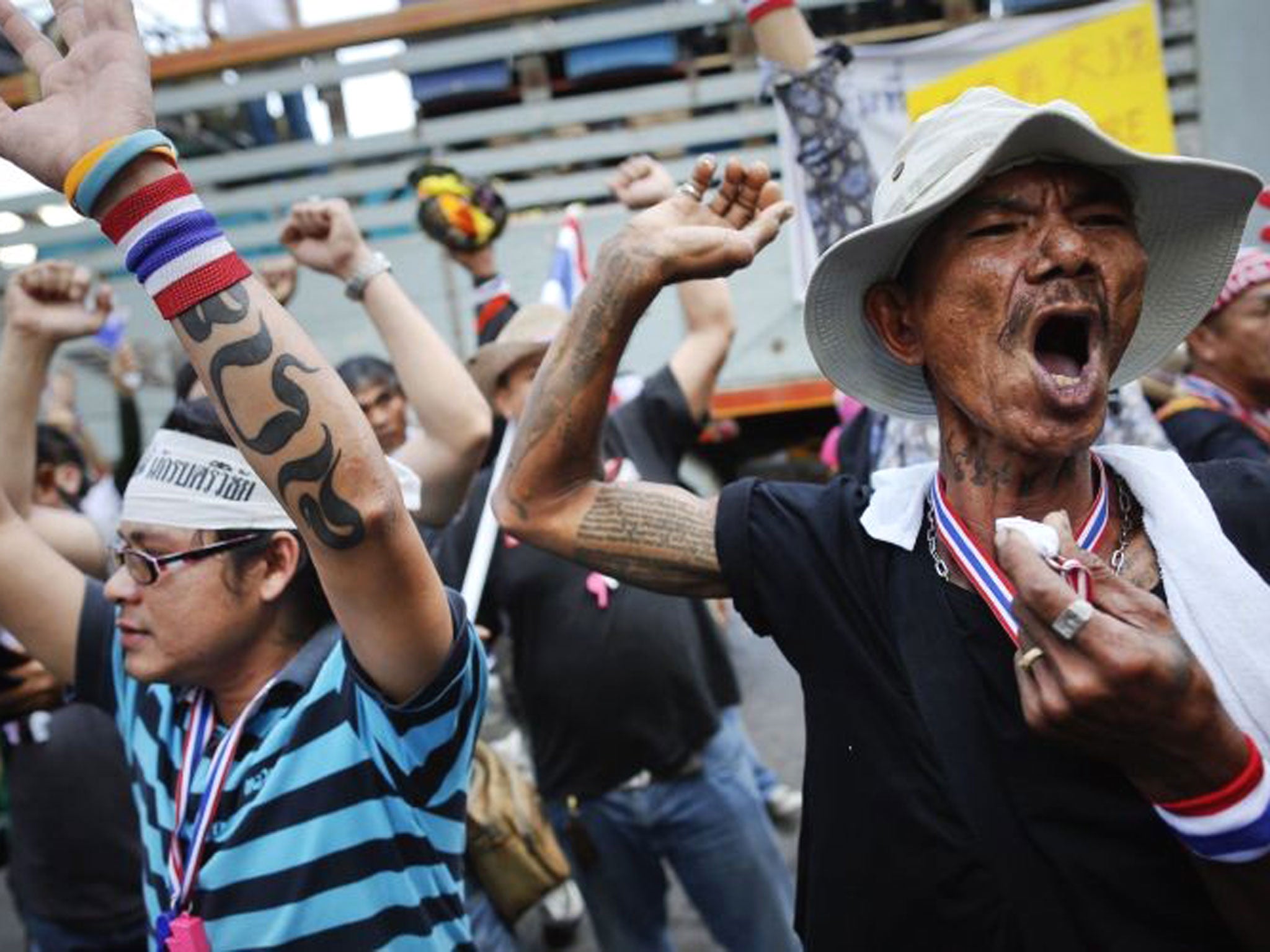Parts of Bangkok brought to a standstill as tens of thousands of protesters attempt to force out Thai PM Yingluck Shinawatra

Your support helps us to tell the story
From reproductive rights to climate change to Big Tech, The Independent is on the ground when the story is developing. Whether it's investigating the financials of Elon Musk's pro-Trump PAC or producing our latest documentary, 'The A Word', which shines a light on the American women fighting for reproductive rights, we know how important it is to parse out the facts from the messaging.
At such a critical moment in US history, we need reporters on the ground. Your donation allows us to keep sending journalists to speak to both sides of the story.
The Independent is trusted by Americans across the entire political spectrum. And unlike many other quality news outlets, we choose not to lock Americans out of our reporting and analysis with paywalls. We believe quality journalism should be available to everyone, paid for by those who can afford it.
Your support makes all the difference.Tens of thousands of anti-government protesters brought parts of Bangkok to a standstill as part of an attempt to shut down the city and force the resignation of Thailand’s prime minister.
Demonstrators blocked a number of major intersections in the city as they sought to make Bangkok ungovernable and force Yingluck Shinawatra to leave. As thousands of protesters took up positions on Monday, the police allowed them to do so, trying to avoid confrontations that could lead to bloodshed.
Ms Yingluck, who already called a new election in an attempt to placate the protesters, offered to meet their leaders on Wednesday to discuss the timing of the poll, which the main opposition party has said it will boycott.
Speaking from Bangkok, deputy prime minister Pongthep Thepkanchana told The Independent: “The protesters demand many things and they also change their demands from time to time.”
He added: “If we have a chance to listen to them we can know their point. We were planning to invite them as well but we have been told they will not participate.”
Indeed, the protesters’ leader, Suthep Thaugsuban, has said he had no intention of backing down and repeated his call for the premier to resign immediately.
“Don’t ask me how long this occupation will last,” Mr Suthep said in a speech to supporters, according to the Reuters news agency. “We will not stop until we win.”
The stand-off is the latest twist in an eight-year conflict that has pitted opponents of former prime minister Thaksin Shinawatra against those who support him.
The two sides cannot be neatly pigeon-holed but supporters of Mr Thaksin have tended to be rural Thais, especially from the north and east, and some elements of Bangkok’s working class. On the other side is a combination of middle-class Bangkok residents, former army officers and elements of the so-called establishment that surrounds the Thai royal family.
Mr Thaksin was ousted by the military in 2006 and sentenced to jail in absentia for abuse of power in 2008. But from his base in Dubai, he still retains huge influence over Thai politics. His younger sister, Ms Yingluck, was elected to power in a convincing win in the summer of 2011.
Eight people, including two police officers, have been killed and scores wounded in violence between protesters, police and government supporters since the campaign against Ms Yingluck’s Pheu Thai party-led government started in November last year. Seven protesters were shot and injured by gunmen over the weekend.
Yet so far, the Bangkok “shutdown” has been reasonably peaceful and reports suggested that for most of the 10m residents of the country’s capital, life went on largely as normal. Whether this remains so is yet to be seen. Given that the protesters say they will not participate in elections until a series of reforms are carried out, analysts see very little room for manoeuvre.
“The campaign by anti-government protesters to derail the 2 February election raises prospects of widespread political violence, and the scope for peaceful resolution is narrowing,” said a report published on Monday by the International Crisis Group. “Protests may aim to provoke a military coup, or encourage a judicial coup.”
The 64-year-old Mr Thaugsuban, a former deputy prime minister, stood down last year from his position with the opposition Democrat party to lead the protests. Both Mr Suthep and former prime minister Abhisit Vejjajiva face murder charges over their role in a 2010 crackdown on pro-Thaksin supporters that left more than 90 people dead. They have denied the accusations.
Mr Suthep’s stated goal is to eradicate the influence of the Shinawatra family on Thai politics. He says Mr Thaksin and his family are guilty of corruption and nepotism. The protest leader has said there is no point having an election until a series of reforms, including an overhaul of the electoral system, are carried out.
Mr Pongthep, the deputy prime minister, said the government was open to considering all sorts of reforms. But he that the result of a general election should not be ignored, even if as many as one million people disagreed with the outcome. He said giving into such demands would amount to “a Coup d’etat”.
He added: “We are trying to uphold democracy.”
Join our commenting forum
Join thought-provoking conversations, follow other Independent readers and see their replies
Comments